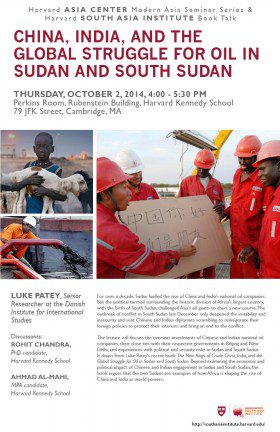SAI Book Talk
Luke Patey, Senior Researcher at the Danish Institute for International Studies
Discussants:
Rohit Chandra, PhD candidate, Harvard Kennedy School
Ahmad Al-Mahi, MPA candidate, Harvard Kennedy School
Note: Due to heightened security because of visiting dignitaries, please enter the Rubinstein building from the JFK park entrance on October 2. Non-Harvard attendees should contact Rohit Chandra (rchandra@fas.harvard.edu) ASAP otherwise they may be unable to enter the building.
For over a decade, Sudan fuelled the rise of China and India’s national oil companies. But the political turmoil surrounding the historic division of Africa’s largest country, with the birth of South Sudan, challenged Asia’s oil giants to chart a new course. The outbreak of conflict in South Sudan last December only deepened the instability and insecurity and sent Chinese and Indian diplomats scrambling to reinvigorate their foreign policies to protect their interests and bring an end to the conflict.
The lecture will discuss the overseas investments of Chinese and Indian national oil companies, their close ties with their respective governments in Beijing and New Delhi, and experiences with political and security risks in Sudan and South Sudan. It draws from Luke Patey’s recent book The New Kings of Crude: China, India, and the Global Struggle for Oil in Sudan and South Sudan. Beyond examining the economic and political impact of Chinese and Indian engagement in Sudan and South Sudan, the book argues that the two Sudans are examples of how Africa is shaping the rise of China and India as world powers.
Luke Patey is a senior researcher at the Danish Institute for International Studies. His work focuses on the political economy of oil in Sudan and South Sudan, the role of China and India in Africa, and the global investments of Chinese and Indian national oil companies. He has written for the Financial Times, The Guardian, The Hindu, and VICE News. He has been a Visiting Scholar at Peking University (Beijing), the Social Science Research Council (New York), and the Centre d’études et de recherches internationales (Paris).

